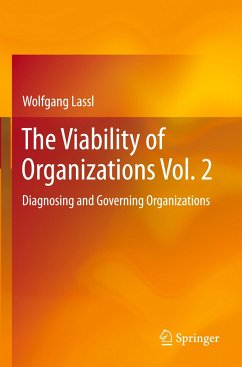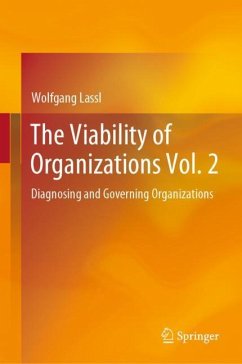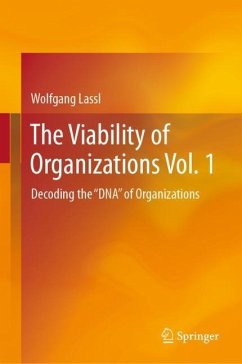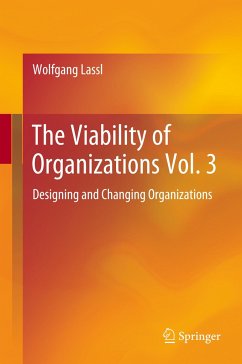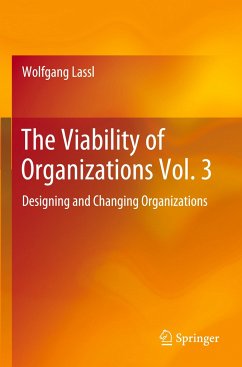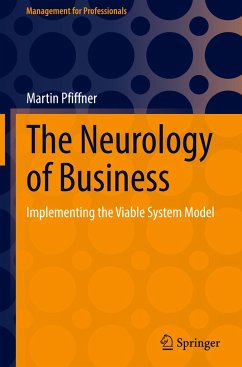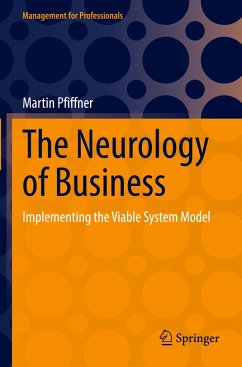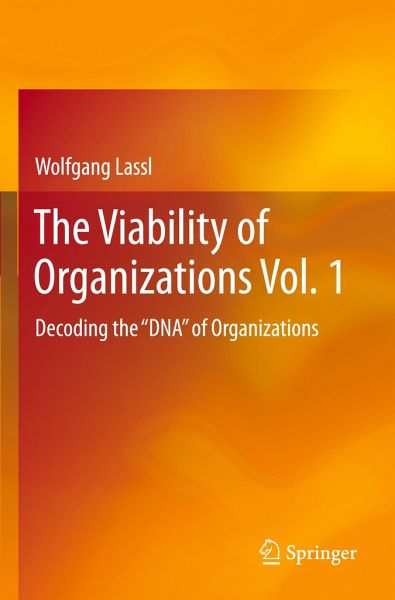
The Viability of Organizations Vol. 1
Decoding the "DNA" of Organizations
Versandkostenfrei!
Versandfertig in 6-10 Tagen
38,99 €
inkl. MwSt.
Weitere Ausgaben:

PAYBACK Punkte
19 °P sammeln!
Today's complexity, speed, and need for adaptation are putting organizations under stress. Understanding how organizations function and truly come alive has become a critical competency. And yet, organizations still seem to lack a solid understanding of what constitutes meaningful, viable, and effective organizational structures.Using the Viable System Model (VSM) as a framework, this three-volume compendium volume offers readers a new and comprehensive perspective on organizations and how they function beyond the organizational chart. Moreover, it equips readers with a rigorous methodology fo...
Today's complexity, speed, and need for adaptation are putting organizations under stress. Understanding how organizations function and truly come alive has become a critical competency. And yet, organizations still seem to lack a solid understanding of what constitutes meaningful, viable, and effective organizational structures.
Using the Viable System Model (VSM) as a framework, this three-volume compendium volume offers readers a new and comprehensive perspective on organizations and how they function beyond the organizational chart. Moreover, it equips readers with a rigorous methodology for analyzing organizations and addressing deep-seated organizational dysfunctions, while also showing them how to redesign their structures and develop better and more tailor-made solutions.
This first volume introduces readers to the VSM and its main components. Readers are taken on a journey, allowingthem to rediscover all-too-familiar aspects in the life of their organization and to become aware of the critical success factors for its smooth functioning and long-term viability. In turn, volumes 2 and 3 provide an in-depth introduction to diagnosing and designing organizations with the help of the VSM. For academics, this compendium rediscovers a theoretical perspective that can help them understand macro-structural issues; at the same time, for VSM experts and researchers alike, it resolves many open aspects in the VSM framework.
"This compendium is a most welcome contribution to Organizational Cybernetics. Lassl provides a detailed analytical and insightful perspective on the currently most powerful organization theory, which is a key to mastering complexity: the Viable System Model. The author also finds new, creative ways of showing the practitioner how to make the model work. If you apply it properly, you can reap huge benefits: the viability of your organization and a prosperous future."Prof. em. Dr. Markus Schwaninger, University of St.Gallen
"There is nothing more practical than a good theory" (K. Lewin). This is exactly what Lassl's books exemplify and prove. By advancing the VSM-based organizational theory and providing ample application-related examples, these books allow the readers to look at their organizations and management from a new perspective, and provides them with the knowledge to trigger and implement practical organizational changes.I have been able to draw upon many cutting-edge examples from Lassl's books for my lectures on the VSM, which have repeatedly convinced students of its value and enabled them to gain an in-depth understanding of the VSM. Particularly Lassl's elaborations on variety management and on the axiom of requisite vertical eigen-variety are cornerstones for every organizational design project, for value-oriented management, and for the overall viability of the organization. I highly recommend the book to all managers looking for ideas for future-oriented design of organizations and of value creation."Prof. Dr. Matthias Müller-Wiegand, Vice President Department Business and Law, Rheinische Fachhochschule Köln/University of Applied Sciences
Using the Viable System Model (VSM) as a framework, this three-volume compendium volume offers readers a new and comprehensive perspective on organizations and how they function beyond the organizational chart. Moreover, it equips readers with a rigorous methodology for analyzing organizations and addressing deep-seated organizational dysfunctions, while also showing them how to redesign their structures and develop better and more tailor-made solutions.
This first volume introduces readers to the VSM and its main components. Readers are taken on a journey, allowingthem to rediscover all-too-familiar aspects in the life of their organization and to become aware of the critical success factors for its smooth functioning and long-term viability. In turn, volumes 2 and 3 provide an in-depth introduction to diagnosing and designing organizations with the help of the VSM. For academics, this compendium rediscovers a theoretical perspective that can help them understand macro-structural issues; at the same time, for VSM experts and researchers alike, it resolves many open aspects in the VSM framework.
"This compendium is a most welcome contribution to Organizational Cybernetics. Lassl provides a detailed analytical and insightful perspective on the currently most powerful organization theory, which is a key to mastering complexity: the Viable System Model. The author also finds new, creative ways of showing the practitioner how to make the model work. If you apply it properly, you can reap huge benefits: the viability of your organization and a prosperous future."Prof. em. Dr. Markus Schwaninger, University of St.Gallen
"There is nothing more practical than a good theory" (K. Lewin). This is exactly what Lassl's books exemplify and prove. By advancing the VSM-based organizational theory and providing ample application-related examples, these books allow the readers to look at their organizations and management from a new perspective, and provides them with the knowledge to trigger and implement practical organizational changes.I have been able to draw upon many cutting-edge examples from Lassl's books for my lectures on the VSM, which have repeatedly convinced students of its value and enabled them to gain an in-depth understanding of the VSM. Particularly Lassl's elaborations on variety management and on the axiom of requisite vertical eigen-variety are cornerstones for every organizational design project, for value-oriented management, and for the overall viability of the organization. I highly recommend the book to all managers looking for ideas for future-oriented design of organizations and of value creation."Prof. Dr. Matthias Müller-Wiegand, Vice President Department Business and Law, Rheinische Fachhochschule Köln/University of Applied Sciences





